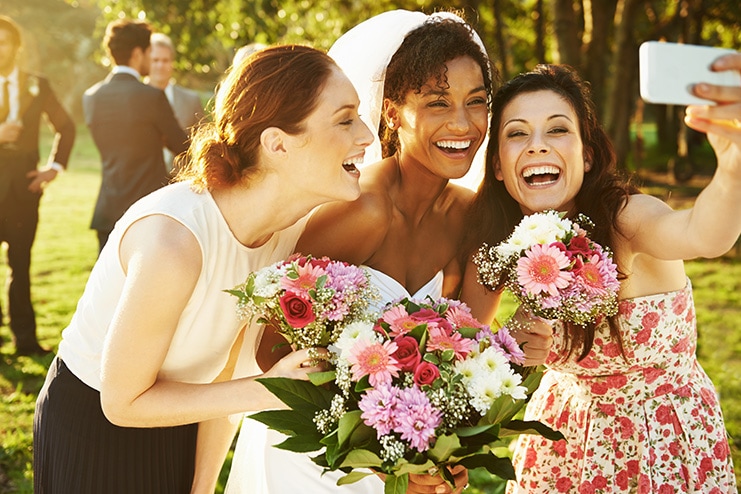Biggest Expenses to Consider When Planning a Wedding
Love might be free, but wedding dresses and gorgeous wedding photography can get expensive. Fortunately, you can create a perfect wedding that works with your finances if you develop a budget for your wedding expenses well before the happy event.
While you aren’t likely to forget about the dress or the cake, there are plenty of big wedding expenses that can slip under the radar. This quick guide to the biggest wedding expenses includes key budgeting tips to help keep you on track.
See how Quicken helps you plan and track your budgets.
Learn more →
Wedding location and getting there
Where will the new couple exchange their vows? And where will they wine and dine their guests, then dance the night away?
Set about 40% of your wedding budget aside for the site of the ceremony and reception venue, which is often the largest single wedding expense, averaging about $12,800 nationwide.
With a large wedding budget, you’ll have hundreds of wedding venues to choose from, including vineyards, museums, and historic ships, as well as the more traditional country clubs and hotel lounges.
But a unique wedding venue can be just as memorable, if not more so, while saving you some cash for other things. Popular venues that can cost less include backyards, private gardens, and national or state parks.
You’ll also need to organize transportation for the wedding party from the site of the nuptials to the reception. This often means hiring a limousine for the bride and groom and arranging shuttles for other members of the party and wedding guests.
A one-stop shop can save money on transportation and might include package deals on things like catering that can save you even more. Just be sure to ask about additional fees, such as insurance or clean-up, so you don’t get hit by surprises.
Flowers & decor
Flowers can make a real dent in your budget for wedding expenses, and you’ll have to set aside extra funds if you want a professional florist to arrange them at the venue.
Also, remember to factor in bouquets for the bride, bridesmaids, and flower girls. You can often save on these expenses by choosing flowers that are in season.
The expense for the rest of your decor will depend at least partly on the size of your wedding reception. Setting hand-carved candles on 100 wedding tables can add up fast.
Instead, consider something less expensive that could mean more to the happy couple. Hand-made centerpieces featuring photos from the couple’s courtship and travels are personal while making great conversation starters.
For a more traditional wedding look, be sure to set aside something extra for those specialty linens, flatware, and place tags. If you’re going for a vintage wedding theme, you’ll need to earmark even more.
If you’d rather go for something quick and easy, picking a pre-decorated wedding venue and reception site can reduce those decorating costs as well as saving time for other wedding preparations.
See how Quicken can help you save up for your big day.
Learn more →
Music expense
Nothing says “wedding” like the traditional “Here Comes the Bride” tune that was a standard of church weddings for many years, but that’s the least of your music expenses.
Many modern couples choose a different song for the ceremony and may opt for pop or contemporary music at the wedding reception so guests can dance the evening away.
Budget money for music both during the ceremony and at the reception. The cost of a live band varies wildly, but if pricing bands isn’t going well, you can often reduce the cost to less than $1,000 by opting for a DJ instead.
If you’re using a wedding planner, they will usually have suggestions for quality music, whether a live band or a DJ. Just remember to include the cost of the wedding planner in your budget!
Photos and video for posterity
Most happy couples choose to pay a professional photographer to snap official pictures of the wedding party and the ceremony, but there are still plenty of decisions to make.
Before you start talking to potential photographers, decide whether you only want photos only of the wedding ceremony. You might also want snaps of a bride or groom’s day out with friends, a bachelor party, the rehearsal dinner, and the reception.
Expect to pay the photographer anywhere from $2,500 to $4,000 on average, depending on what you want and where you live. It’s a good idea to shop around for package deals.
Also, remember that a photographer is not the same thing as a videographer. If you want video of your wedding and/or the reception, that will add to the expense.
Dressing the part
Whether you opt for a traditional wedding — with a white, full-length bridal gown and a tux for the groom — or choose a more modern look, the clothing for your wedding party will account for a solid chunk of your wedding budget.
The sky’s the limit when it comes to the potential price of the wedding dress and veil, but a recent study found that the average bride spends $1,500 – $2,500.
No matter what you decide to spend on your own wedding-day garments, remember to include the cost of alterations in your budget.
If you’re also paying for the suits and dresses of the wedding party, remember to include them in the wedding budget, too. Renting tuxedos instead of buying them will lower the cost considerably.
And don’t forget the cost of the happy couple’s get-away outfits!
Food and drink
The wedding cake is the star of the show, but many couples offer their guests hors d’oeuvres and dinner as well, complete with beer, wine, spirits, champagne, and even after-dinner liqueurs.
If you’re having your reception catered, you’ll probably have a firm quote for the budget — typically around $85 per person.
Even if family and friends are putting your wedding dinner together, those ingredients, not to mention the drinks, are still going to cost money. Be sure to account for that in your overall wedding budget.
Finally, remember to include the cost of the rehearsal dinner in that food category!
Rings and things
The traditional words, “With this ring, I thee wed,” might bring sweet tears to your eyes, but you’ll avoid a few bitter ones over the cost of the wedding rings themselves by remembering to budget for them.
Of course, most couples pay attention to cost when choosing their rings, but they might not be thinking about the overall wedding budget at the time.
If you want your wedding rings to be separate from the rest of your budget, that’s perfectly fine. Just make it a conscious choice, not an oversight!
On the subject of small trinkets that mean a lot, wedding favors for your guests and your wedding party should also go into your budget — as well as printed wedding invitations and thank-you cards.
Good tips (literally)
The worst culprits in any budget are the small details that tend to slip through the cracks, and a wedding budget is no exception. Sales tax, tips for all the vendors, and service charges are often separate from gratuities and tend to be overlooked.
Keep a sharp eye out for the symbol “++” in the quote for your reception catering. That usually means sales tax and tips are not included. These charges can add as much as 30% to your total.
Anyone who isn’t their own boss will usually expect a tip for their wedding services. That includes waiters, florists, servers, bartenders, valets, coat-check attendants, photographers, makeup artists, hair stylists, shuttle and limo drivers, and cake deliverers.
Finally, take some time to think about your specific wedding and any reasonably foreseeable surprises.
If you’re renting a wedding or reception venue, ask about overtime charges in case things run late. If you’re having your wedding outdoors, understand the cost of any alternative venue you have lined up in case it rains.
With a little planning — okay, a lot of planning — you can have the wedding of your dreams at a price you can afford. Like any other financial planning, your wedding budget will pay off in the money you save, starting with a little splurging on your honeymoon!
See how Quicken can help you budget and save as a couple.
Learn more →
Quicken has made the material on this blog available for informational purposes only. Use of this website constitutes agreement to our Terms of Use and Privacy Policy. Quicken does not offer advisory or brokerage services, does not recommend the purchase or sale of any particular securities or other investments, and does not offer tax advice. For any such advice, please consult a professional.



